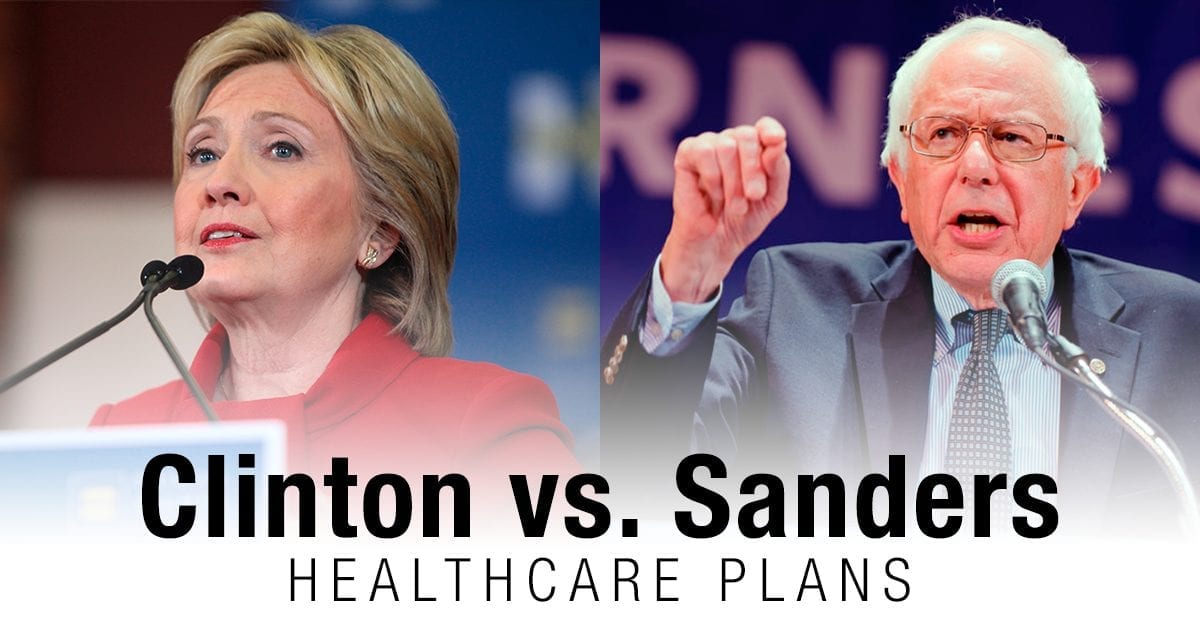
If Hillary Clinton or Bernie Sanders wins the presidency, the U.S. will have Obamacare and then some. Especially if Sanders is elected. Both candidates have been very vocal – and quite detailed – about their plans for healthcare.
The Hillary Agenda
Anyone old enough to remember Bill Clinton’s 1992 campaign will recall his promise of healthcare for all within the first 100 days of his taking office. That, of course, didn’t happen. Hillary, described in a 1993 New York Times piece as “the President’s wife and health care expert,” was a driving force behind that promise. And she seems just as fierce about healthcare today – though some media outlets question her true motives.

Hotly contested in 2009 – and later dropped the same year — the public option for health insurance would have meant direct competition with private health insurers. The aim was to drive down health care costs and premiums. Moderate Democrats showed lukewarm interest, while Republicans were decidedly opposed.
Hillary Clinton strongly supports protecting women’s access to contraception, safe and legal abortion, and other aspects of reproductive health. She also wants to extend exchange plans to undocumented immigrants to ensure the health of their children.
Bernie’s Vision

Sanders claims that America spends almost double per capita on healthcare as other nations, while still leaving 40 million people uninsured. He has a record of advocating for universal healthcare, including introducing the American Health Security Act of 2013, and sponsoring the Medicaid Generic Drug Price Fairness Act. Sanders has publicly denounced drug companies as crooked. His Medical Innovation Prize Fund Act could vastly change the way research and development of new drugs is financed, and greatly lower their prices.
Financing Health
 To fans of universal healthcare, these are blissful visions, indeed. But how do Sanders and Clinton plan to finance the enormous cost? Taxes, of course.
To fans of universal healthcare, these are blissful visions, indeed. But how do Sanders and Clinton plan to finance the enormous cost? Taxes, of course.
Sanders wants to amend the tax code, creating the American Health Security Trust Fund. The money for this trust fund could come from a 6.7 percent employer payroll tax, a new 2.2 percent healthcare income tax on every citizen, taxes on securities transactions, and surcharges on the incomes of America’s more affluent citizens. But even with all these taxes and fees, some experts doubt Sanders could deliver on his promises.
Clinton also hopes to force the 16 holdout states that have refused Obamacare into line with the other 34. She wants the US government to cover 100 percent of these states’ costs for the first three years after they adopt Obamacare. Currently the government pays 100 % for three years, but that stipulation ends this year. The 34 Obamacare states will now have to start paying a small percentage of the total cost. She’s hoping that money will melt the ideological resistance of the 16 holdout states.
Insurers and Health Care Providers
Sanders claims that a single-payer system would reduce the many dollars insurers waste on administration and billing. Because we all know the government is the height of efficiency, right?
Where does all this leave private insurance companies? Not in the greatest place. Sanders wants to eliminate copays, deductibles and arguments with insurance companies about what should or shouldn’t be covered. His website rhetoric reduces the role of insurance companies to “paper pushing and debt collection.”
An article on the CNN Money website doubted the seamlessness of transitioning from America’s current reliance on private insurers to a Canadian or European style government-run healthcare program. CNN also questions whether doctors and hospitals would tolerate steep rate cuts. An analysis by economics professor Gerald Friedman (commissioned by the Sanders campaign) estimated that under Sanders’ system hospitals would receive 9.4 % less, and doctors 10.7 % less, than what they currently get from Medicare patients. And they already receive less for Medicare patients than they do from insurers. Friedman posits that they’d recoup the losses almost four-fold in the money they’d save not having to deal with insurers.
Ouch.
According to the Statista website, except for a little glitch around 1990, the number of workers in the health insurance industry has steadily grown annually since 1960. In 2014, 492,400 individuals worked as health insurance employees, according to Statista. Add in folks who work in medical billing and, according to CNN, you have about 2 million workers. What’s going to happen to them if the government takes over with a public option?
 It would cost about $20 billion to retrain and find new jobs for those workers, according to single payer advocate Physicians for a National Health Program. In his 2013 universal healthcare bill, Representative John Conyers, a Democrat from Michigan, included retraining and temporary payments to displaced employees. But the plight of medical insurance and billing employees doesn’t seem to be Sanders’ top concern.
It would cost about $20 billion to retrain and find new jobs for those workers, according to single payer advocate Physicians for a National Health Program. In his 2013 universal healthcare bill, Representative John Conyers, a Democrat from Michigan, included retraining and temporary payments to displaced employees. But the plight of medical insurance and billing employees doesn’t seem to be Sanders’ top concern.
Clinton’s plan is much less drastic. In fact, Forbes went so far as to call it “toothless and contradictory.” The Forbes website accused Clinton of posturing as though she’s taking on the healthcare industry while being sure to not do anything that would upset the status quo. According to Forbes, the healthcare industry is a trusty source of speaker fees for Clinton, having already paid her more than $2 million.




